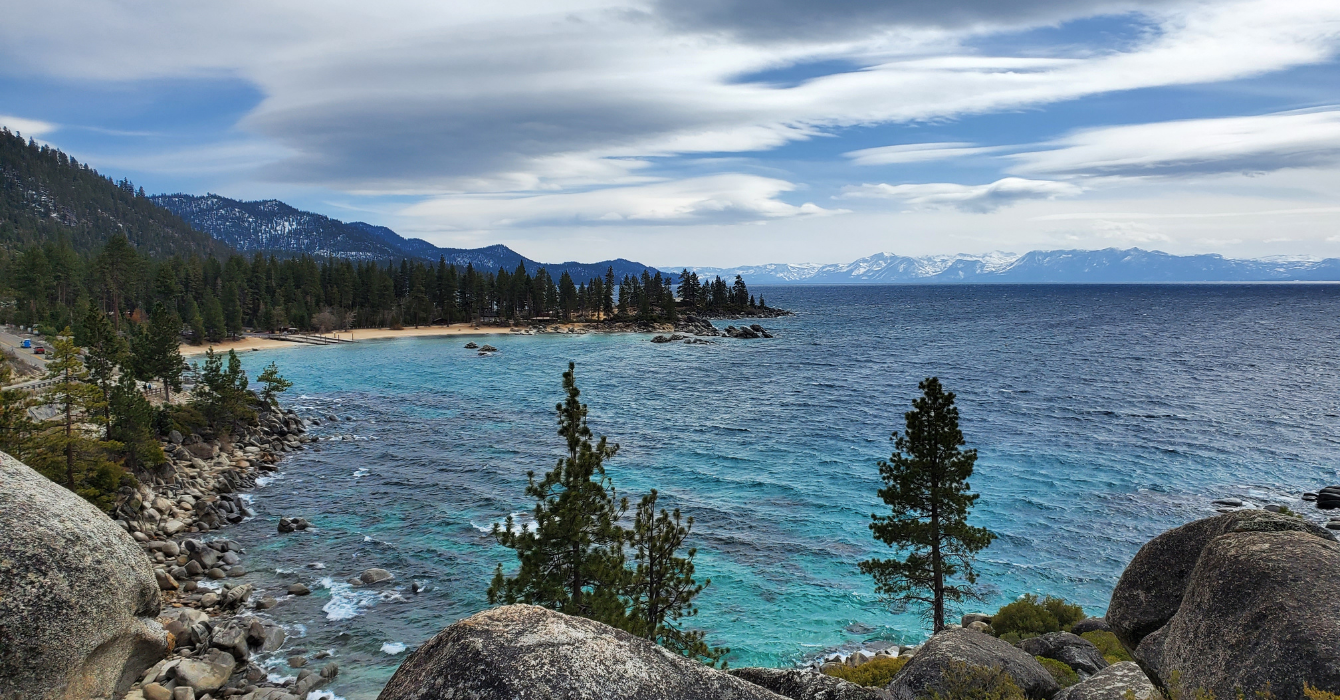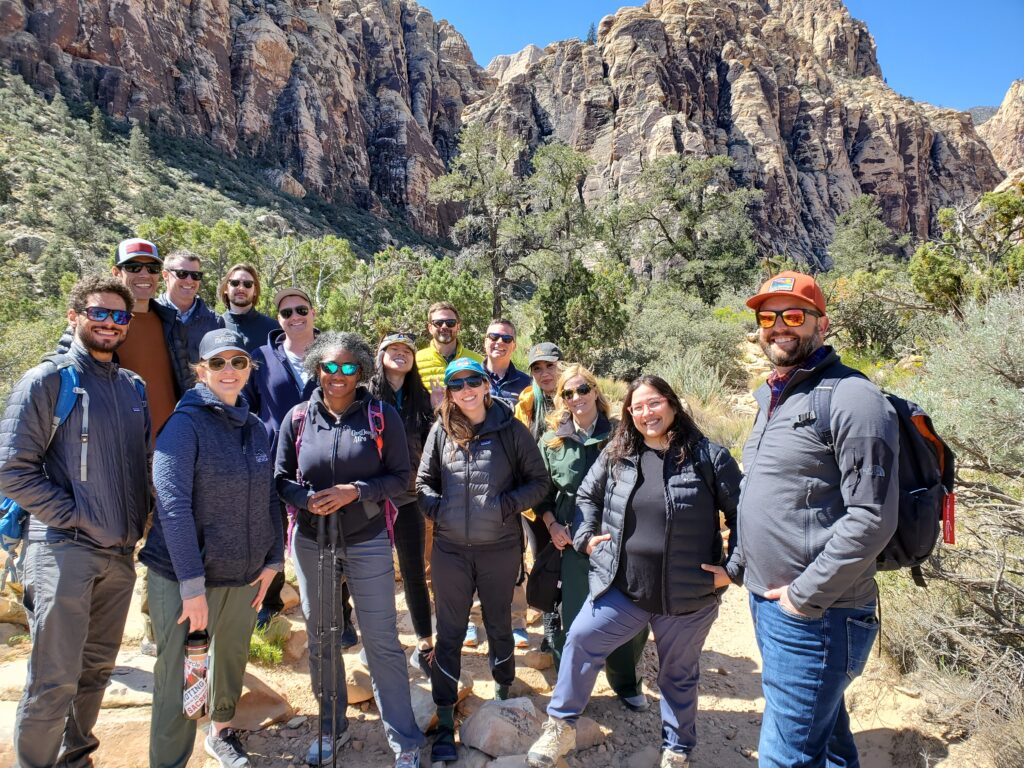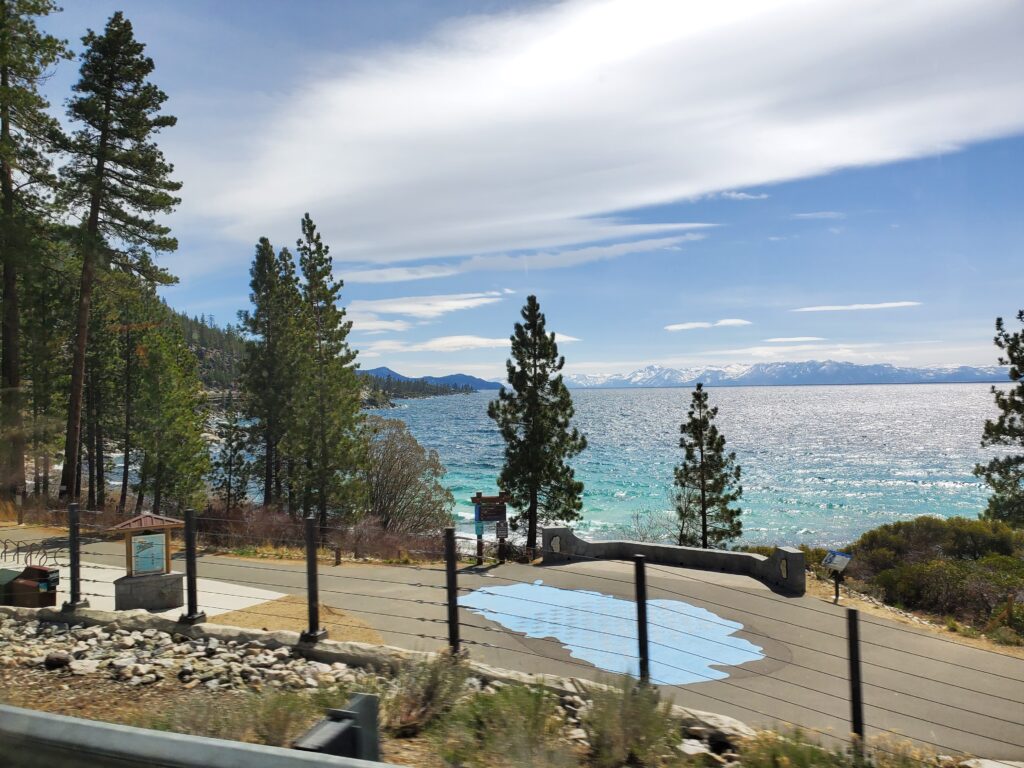
NCEL Events
Outdoor Recreation Lessons from Nevada
May 2, 2022
The past two years have seen an uptick in outdoor recreation, as many of us have turned to nature for physical and emotional refuge during the most challenging time in recent history.
To learn more about this surge in outdoor engagement and its implications for environmental decision-making, NCEL staff traveled down to Nevada. Home to the nation’s first National Recreation Area, five distinct ecoregions, 27 State Parks, 60 million acres of accessible public lands, and 4,000 species of wildlife. Nevada was an ideal venue for this discussion.
We split our time between Las Vegas and Reno where we were joined by state legislators, outdoor industry professionals, disability activists, federal land managers, and other stakeholders, all working on maintaining the delicate duality of outdoor recreation and stewardship. NCEL was grateful to partner with the Outdoor Industry Association, Nevada’s Division of Outdoor Recreation, the REI Co-op, and Patagonia to convene leaders in the outdoor space.
Here are some of our takeaways.
Recreation is a gateway to stewardship
Behind Alaska, Nevada is the wealthiest in the country when it comes to federal lands, with nearly 90% of the state publicly accessible. These lands help drive Nevada’s seasonal outdoor recreation economy, which generates $16.6 billion annually in consumer spending and supports nearly 90,000 employees.
However, post-COVID, many have noted that visitation to these public lands isn’t seasonal anymore.
Attendees expressed that this is both a blessing and a curse, and is being felt across many states. Year-round visitation increases the likelihood that people will develop a sense of place and connection to nature, which can then, in turn, help foster conservation-minded attitudes and perceptions. These perceptions are key when it comes to support for decisions to protect and conserve natural areas. At the same, it provides a challenge for lawmakers and managers to keep these pristine areas undisturbed from human impacts.
While in Vegas, our group took a hike at Red Rock Canyon National Conservation Area, one of the areas hit hardest by skyrocketing visitation, and then finished the day with a convening and meal at the local REI. Conversation included the challenges and opportunities associated with balancing outdoor recreation with stewardship.

One local example of how this balance is being achieved is the construction of the new Legacy Trail outside of Red Rock NCA, a bicycle path that connects downtown Vegas to Red Rock’s visitor center. This is an effort to reduce vehicle traffic and emissions, while also offering a safe and accessible means of getting to the park by bike or foot.
Additionally, NV Governor Steve Sisolak recently signed an agreement establishing the Nevada Agreement for Recreation Shared Stewardship, a strategic partnership that will serve as a model for multi-agency collaboration to address challenges facing Nevada’s communities and natural environment, “while advancing sustainable outdoor recreation opportunities and a vibrant outdoor economy for the state.”
Event attendees credited the bike trail, shared agreement, as well as the implementation of the new Nevada Division of Outdoor Recreation as three key elements in helping shape and contain the growing outdoor recreation economy.
A shifting narrative: what “counts” as outdoor recreation?
Another theme that emerged was the paradigm shift occurring around what it means to recreate outdoors. Recently, NCEL partner REI Co-op changed its tagline from “Get Outdoors” to “Get Outside,” as an effort to broaden the definition of what “counts” as outdoor recreation, and to move away from the exclusive, and often white- and wealthy-dominated culture of outdoor sports. Backyard BBQs, dog walking, and gardening are just as valuable as mountaineering, backpacking, and hunting, and attendees expressed commitment to publicizing this notion.
The shift is also accompanied by changes at the legislative and park management levels. One initiative is the newly constructed, ADA compliant Tahoe East Shore Trail, a great example of public funding leveraging private philanthropy (over $1 million raised privately), led by the fundraising efforts of the Tahoe Fund. The project is also a key infrastructure improvement, providing safer, better, and more sustainable access to natural resources for users across user groups and ability levels.

Lastly, this convening made clear that quality access to natural spaces is a basic human right, and that Nevadans are working hard to make it easier for people to get connected to and feel safe recreating on public lands.
Indigenous Leadership in Outdoor Recreation and Conservation
A final, and perhaps, central theme that emerged from NCEL’s trip to Nevada was that Indigenous groups are at the forefront of efforts to braid together recreation and conservation. Initiatives to protect sacred spaces, like the proposed AviKwaAme National Monument (“Spirit Mountain” – led by the Fort Mohave Tribe, or Pipa Aha Macav) are gaining momentum. Indigenous-led efforts in Nevada are widely respected and help elevate the work of Nevada’s Great Basin Tribes, which includes Washoe (“Wa She Shu”), Northern Paiute (“Numu”), Southern Paiute (“Nuwu”) and Western Shoshone (“Newe”).
Lessons for other states
While Nevada’s outdoor recreation context is unique, there are broadly applicable lessons for other states. States have myriad opportunities to sustainably expand outdoor economies, while prioritizing biodiversity, land, and water protection. Some options informed by this trip include:
- Establishing an Office of Outdoor Recreation – NCEL staff learned how integral this office has been in the implementation of outdoor recreation goals and coordination of outdoor stakeholders.
- Fund the development of grant programs around outdoor access and equity, such as Outdoor Equity Program Grants, aimed at providing quality opportunities for under-served Nevada Students to experience the outdoors
- Introduce a state 30×30 goal – Nevada’s passed in 2021, setting a 30×30 goal for the state, and making clear the priority to slow both the biodiversity and climate crises, as well as maintain space for outdoor recreators alike.
- Provide exclusive funding for Indigenous conservation groups to support the designation of cultural and sacred sites.
- Consider Extended Producer Responsibility policies as they relate to outdoor gear and equipment as this industry expands.
- Conduct an economic non-market valuation of the benefits of outdoor recreation in order to make a strong business case for supporting the industry
For more policy options and bill language, see here.
Please contact NCEL if this convening is something you’d like to organize in your state.